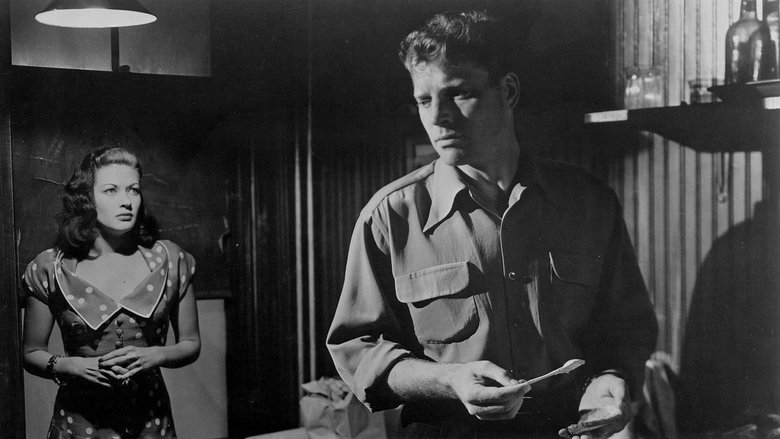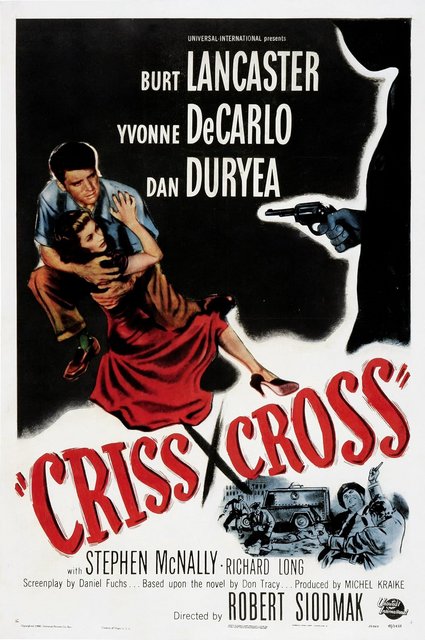← Back to Reviews

in

Criss Cross - 1949
Directed by Robert Siodmak
Written by Daniel Fuchs
Based on a novel by Don Tracy
Starring Burt Lancaster, Yvonne De Carlo & Dan Duryea
This 1949 film noir crime film is all about the dame - or perhaps obsession would be a better way to put it. Steve Thompson (Burt Lancaster) comes home to Los Angeles after travelling the country working here and there. He spent that time away nursing his broken hopes and dreams after being married to Anna (Yvonne De Carlo) and then divorced - but he hasn't come back looking for her. No way. I mean, sure, he ends up heading pretty much straight away to their old hangout - but where else is he to go? He's catching up with friends and good times, and if he happens to see Anna he's at least going to say hello. No harm in being civil. No harm in paying your respects to your past. He doesn't want to get involved again. Does he? Especially since Anna now all but belongs to crime boss Slim Dundee (Dan Duryea). No way is he going to make a crazy play, and put his future and life on the line trying to rescue this old flame from a crazy gangster.
Sometimes it pays to never look back. Steve does it once in Criss Cross and before you know it he's trying to pull off an impossible heist, and hoodwink deadly crime figures. This movie takes time to really pay attention to the slow, inexorable slide to a kind of inevitability that Steve, narrating, keeps on telling us was some kind of fate via chance. He'll hang out places he's always destined to come across Anna, and when he sees her he treats it like a million-to-one shot. You can tell that he's never really gotten over her, even when he first arrives back in Los Angeles. He's too ready and eager to push his "I didn't come looking for her" narrative - it's always the first thing he says, but it just adds weight to the theory that she's all he ever thinks of. His mother tries to save him, and his detective friend, Pete Ramirez (Stephen McNally) also gives it his best shot. No force on earth can stop his ceaseless quest.
When the movie starts we're on the verge of an armored-truck heist, and I thought that's what this film would be - but it turns into more of a dramatic tussle involving not a love triangle, but a triangle of obsession, steamy angst, broken promises and painful double-crosses. Director of photography Franz Planer shows us his dark noir credentials - Planer had considerable experience, and had worked prolifically since 1919. Daniel Fuchs' screenplay is stuffed full of the mannerisms and dialogue that's instantly definable, and Miklós Rózsa, a name I'm getting used to, keeps the steamy heat up music-wise. Criss Cross got mixed reviews upon release, but has risen in stature and can be seen more clearly in context with the early film noir genre as a whole. The performances can't really be criticised, with Lancaster, De Carlo and Duryea sharp as knives and bristling with nervous energy - there's a lot of love and hate in the room when any of this film's three main characters are together.
So, I liked it fine - one I had to pay keen attention to, but rewarding. Before finishing I have to mention that lady on that bar stool - she seems extraneous, but it was nice having her there (most of the time drunk). She's in the credits as "The Lush" and was played by Joan Miller, who didn't really have a big career. Now and then one of those characters giving out drunken comments and rarely seen away from their seat at a bar comes along - I like 'em (though not in real life.) I like Burt Lancaster, and movies that deal with romanticized obsession. I haven't seen that Steven Soderbergh remake called The Underneath - but I imagine this story really suits it's era, and thus I'm not sure if I really want to. This is a film that improves with a second watch - knowing everything actually enhances the film's opening scenes, which work fine on a first watch, but take on an added gravitas when you know the weight Steve and Anna are carrying - knowing not only that a heist is on, but also a very dangerous double-cross. Noir often improves on rewatches - the sense of doom and fate only thickens when you become familiar with it's inevitable siren song.

Criss Cross - 1949
Directed by Robert Siodmak
Written by Daniel Fuchs
Based on a novel by Don Tracy
Starring Burt Lancaster, Yvonne De Carlo & Dan Duryea
This 1949 film noir crime film is all about the dame - or perhaps obsession would be a better way to put it. Steve Thompson (Burt Lancaster) comes home to Los Angeles after travelling the country working here and there. He spent that time away nursing his broken hopes and dreams after being married to Anna (Yvonne De Carlo) and then divorced - but he hasn't come back looking for her. No way. I mean, sure, he ends up heading pretty much straight away to their old hangout - but where else is he to go? He's catching up with friends and good times, and if he happens to see Anna he's at least going to say hello. No harm in being civil. No harm in paying your respects to your past. He doesn't want to get involved again. Does he? Especially since Anna now all but belongs to crime boss Slim Dundee (Dan Duryea). No way is he going to make a crazy play, and put his future and life on the line trying to rescue this old flame from a crazy gangster.
Sometimes it pays to never look back. Steve does it once in Criss Cross and before you know it he's trying to pull off an impossible heist, and hoodwink deadly crime figures. This movie takes time to really pay attention to the slow, inexorable slide to a kind of inevitability that Steve, narrating, keeps on telling us was some kind of fate via chance. He'll hang out places he's always destined to come across Anna, and when he sees her he treats it like a million-to-one shot. You can tell that he's never really gotten over her, even when he first arrives back in Los Angeles. He's too ready and eager to push his "I didn't come looking for her" narrative - it's always the first thing he says, but it just adds weight to the theory that she's all he ever thinks of. His mother tries to save him, and his detective friend, Pete Ramirez (Stephen McNally) also gives it his best shot. No force on earth can stop his ceaseless quest.
When the movie starts we're on the verge of an armored-truck heist, and I thought that's what this film would be - but it turns into more of a dramatic tussle involving not a love triangle, but a triangle of obsession, steamy angst, broken promises and painful double-crosses. Director of photography Franz Planer shows us his dark noir credentials - Planer had considerable experience, and had worked prolifically since 1919. Daniel Fuchs' screenplay is stuffed full of the mannerisms and dialogue that's instantly definable, and Miklós Rózsa, a name I'm getting used to, keeps the steamy heat up music-wise. Criss Cross got mixed reviews upon release, but has risen in stature and can be seen more clearly in context with the early film noir genre as a whole. The performances can't really be criticised, with Lancaster, De Carlo and Duryea sharp as knives and bristling with nervous energy - there's a lot of love and hate in the room when any of this film's three main characters are together.
So, I liked it fine - one I had to pay keen attention to, but rewarding. Before finishing I have to mention that lady on that bar stool - she seems extraneous, but it was nice having her there (most of the time drunk). She's in the credits as "The Lush" and was played by Joan Miller, who didn't really have a big career. Now and then one of those characters giving out drunken comments and rarely seen away from their seat at a bar comes along - I like 'em (though not in real life.) I like Burt Lancaster, and movies that deal with romanticized obsession. I haven't seen that Steven Soderbergh remake called The Underneath - but I imagine this story really suits it's era, and thus I'm not sure if I really want to. This is a film that improves with a second watch - knowing everything actually enhances the film's opening scenes, which work fine on a first watch, but take on an added gravitas when you know the weight Steve and Anna are carrying - knowing not only that a heist is on, but also a very dangerous double-cross. Noir often improves on rewatches - the sense of doom and fate only thickens when you become familiar with it's inevitable siren song.
